LEARN HOW TO RECEIVE
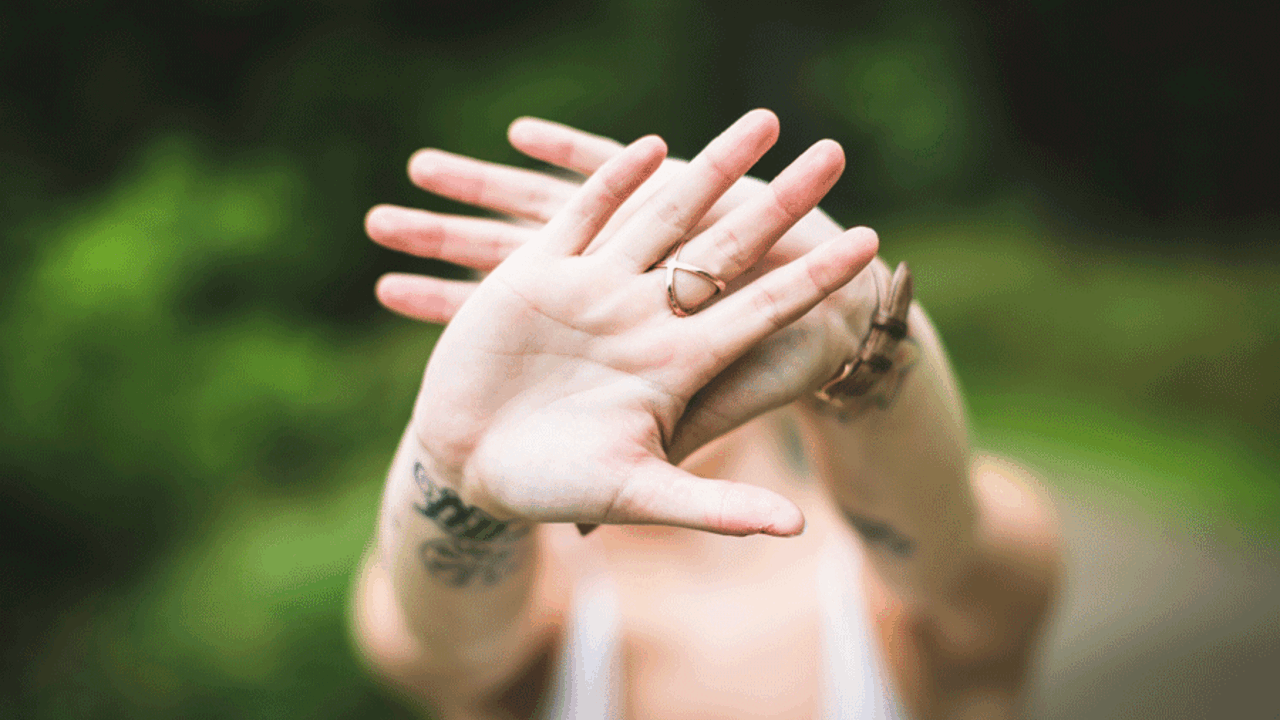
START ACCEPTING GRACIOUSLY AND STOP REFUSING HELP
Until we can receive with an open heart, we’re never really giving with an open heart. When we attach judgment to receiving help, we knowingly or unknowingly attach judgment to giving help.” ~ Brene Brown ~
I don’t ask others for help. I don’t even like when someone offers to help. I hate when people want to bring a dish to party I’m hosting, or pitch to help with my kids, or heaven forbid clean my house in any way. I take it as an insult – an attack against my ability to do it all. I always sharply decline and resolve to prove just how capable I am to do it all on my own.
A few years ago, I hosted a “fancy” holiday party for friends. Because I’d always wanted to attend the type of Christmas parties you see in movies, glittering glasses, twinkle lights, tiny plates and pretty dresses, I decided to host one. For weeks I scoured Pinterest for recipes and ideas. I shopped and baked and cooked. I bought gold charger plates and tiny tea lights. I had my husband make the perfect party playlist. I found a fabulous dress and I spent the week leading up to to the event finalizing every last detail. I vehemently refused help from anyone who dared offer. I wanted to demonstrate what an amazing hostess I was and to make it a fabulous experience for everyone, complete with sugared cranberries, 12 different kids of homemade Christmas cookies, homemade candied nuts, warming trays with toothpick appetizers, and every alcoholic beverage and mixer you could imagine.

The party was a success, but I was exhausted. I wasted so much energy worrying about every detail and working to prove how capable I was, I didn’t even enjoy it. Allowing others to contribute, lowering the bar, and focusing on what mattered – time with friends, would have made it far more enjoyable. I could give you hundreds of similar examples of my inability to accept help from virtually anyone…friends, my mother in law, my husband. I have this insatiable desire to do it alone and prove I am capable.
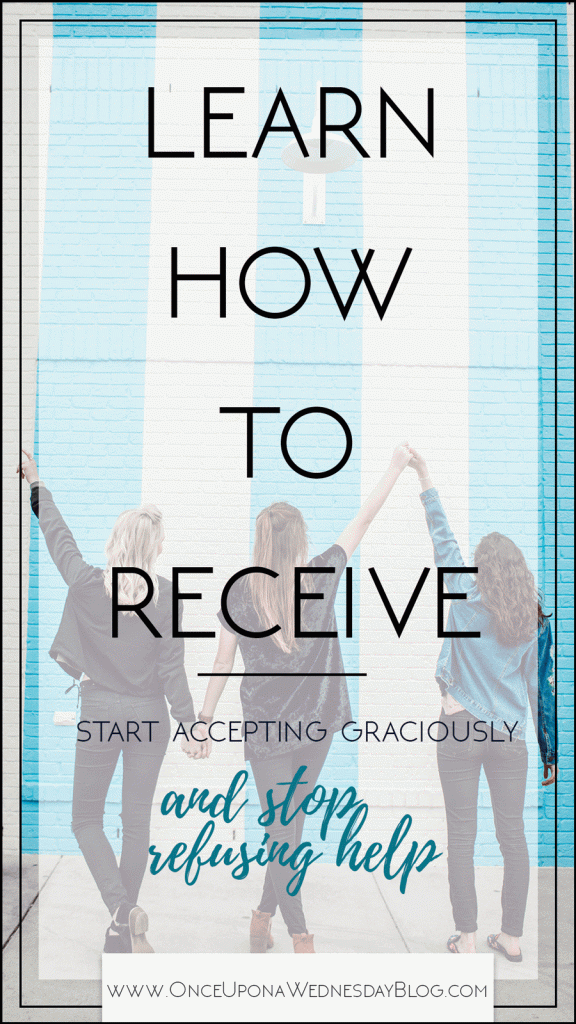
ACCEPTING HELP DOESN’T MAKE YOU WEAK
Growing up, I was always the pretty girl’s friend, in someone’s shadow, or trying desperately to keep up. Years and years of working to prove I was good enough really carved a lasting scar into my identity. Even now, with seemingly nothing left to prove, I still struggle to accept help in any form because it feels like an admission of weakness.
Our society glorifies people who “pull themselves up by their bootstraps” and make their own way. We reward being busy, getting shit done, and entrepreneurship. We cheer for the underdog who overcomes impossible odds on her own. We value independence. It’s easy to believe that asking for help is admitting you’re incapable of greatness. But this is utter bullshit. Just because you can do it alone, doesn’t mean you should.
Amanda Palmer, author of The Art of Asking; or How I Learned to Stop Worrying and Let People Help sums it up perfectly…
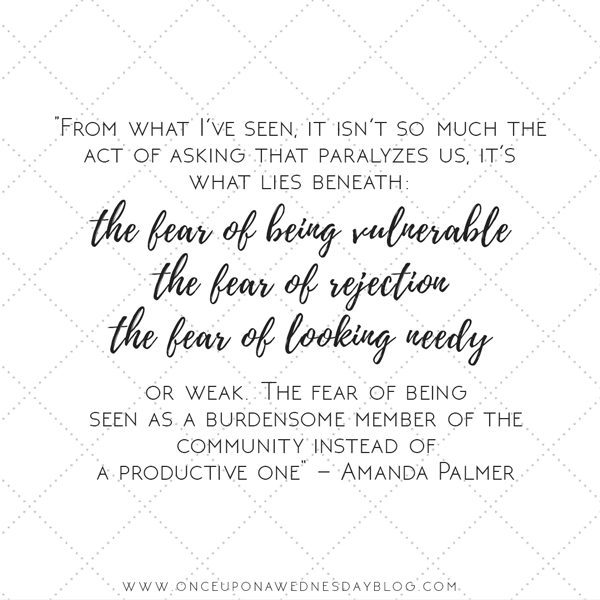
The reality is, the inverse of our fears is actually true. Accepting help is not a sign of weakness, refusing it is. Our obstinate insistence on doing it all comes from a place of fear and desire to shape how we are perceived. Honest, intelligent, and competent people have no shame in asking for help. They know no one can do it all and everybody wins when we work together. Successful companies value collaboration and know that productivity and satisfaction increase when we’re part of a team. We may think we’re being strong, but refusing help only highlights our insecurities and puts more space between us and our community of friends and family who genuinely want to be of service.
When you don’t ask for help when you need it, you assume all of a burden that might easily (and gladly) be shared. But you also deprive those who’d love to assist you of the opportunity to do so.
Being open to receiving isn’t just about taking help. When’s the last time you graciously accepted a compliment, gift, or advice. Why is it so difficult to accept sincere gestures or words from people who care about us? Why do we get weird, uncomfortable, and defensive instead of accepting graciously? Quit being an apologist. Fully accept the compliments you deserve, without self-deprecation, or changing of the subject.
BUT ISN’T IT BETTER TO GIVE THAN RECEIVE?
We don’t want to feel like anyone owes us anything, we don’t want to be a burden, we don’t feel worthy, or we want to prove we’re low maintenance, easy peeps who don’t need anything from anybody. Hands down, most of us are far more comfortable giving than receiving. We would never hesitate to lend a hand, give a sincere compliment, or go out of our way for someone else, and yet as Brene Brown says in the opening quote, “Until we can receive with an open heart, we’re never really giving with an open heart. When we attach judgment to receiving help, we knowingly or unknowingly attach judgment to giving help.”

If I believe accepting help means I’m not enough, then wouldn’t it be safe to assume that someone who accepts my help isn’t enough? Of course not, right? And yet, by refusing help from others we are essentially saying, “you shouldn’t take help either” or “I’m better than you because I don’t need help.” And here’s the underlying issue – we continue to hold ourselves to a different standard. We judge ourselves much more critically than we would ever dream of judging others. Regardless, the message we’re sending is the same, “It’s okay for you to need help, but me, I wouldn’t dream of being needy, I’m better than that.” When we open ourselves up to being vulnerable enough to accept help we give others permission as well.
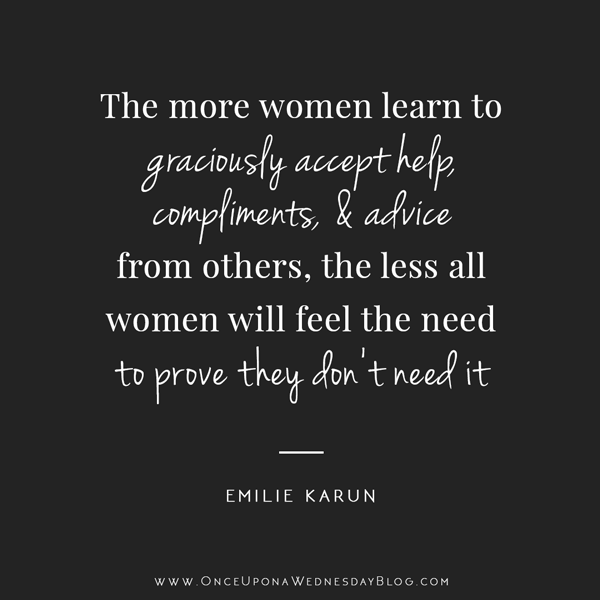
THE GIFT OF RECEIVING
Letting others help is a gift, for you AND them. Think about how good it feels to help someone else. When we cling to the idea that it is better to give than receive, it makes receiving really difficult, whether it’s a compliment, gift, advice, or an offer to help. We feel guilty and uncomfortable instead of grateful and appreciative. Instead of taking all the giving-feel-goods for yourself, let others share in that joy.
When you receive, you are actually giving. You are giving the other person the opportunity to give to you.
True, meaningful relationships can’t exist without give and take. Both people need to show vulnerability, give help and be helped, and let their guard down. How can you expect to create authentic, real relationships when you’re not being authentic and real? If you’re not being vulnerable you can never actually connect with another. As Glennon Doyle says, “You can be perfect and admired or real and loved.” How many of us feel like we need to be perfect because we want people to love (or like) us? But the irony is, by trying to prove our worthiness so people will like us, we are actually preventing them from getting to know the real us…which is crucial for the real relationships we crave.
Receiving with an open, guilt free heart all comes down to vulnerability. No one knows vulnerability better than Brene Brown, a social research professor at the University of Houston who has spent the past two decades studying vulnerability, courage, authenticity, and shame. Her famous Ted Talk is something every women (and human) needs to make time to watch.
“The difficult thing is that vulnerability is the first thing I look for in you and the last thing I’m willing to show you. In you, it’s courage and daring. In me, it’s weakness,” says Brene. We need to be brave enough to let our guard down. We need to receive with an open heart. We need to not only show the world we aren’t perfect, but sincerely believe that we don’t need to be.
THE BEN FRANKLIN EFFECT
There is a psychological phenomenon commonly known as the “Ben Franklin Effect” and it explains why people wind up liking you more when you let them do you a favor. Supposedly, Benjamin Franklin had a hater. To get him to come around, Franklin decided to ask the man if he could borrow one of the books from his library. The man was flattered and lent it; Franklin returned it one week later with a thank you note. The next time they saw each other, the man was exceedingly friendly to Franklin and ultimately they stayed friends until the man died.
Research and experiments support this phenomenon. Doing someone a favor makes us like that person more. When we show vulnerability it fosters connection and opens the door for a genuine relationship. I’ve been working to not only accept help graciously, but I’ve started asking directly when I need it. Having four kids in sports and activities has put a huge demand on our time and ability to get everyone where they need to be in a given week. I’ve started asking friends and other parents if they can pitch in when I’m in a bind and they are always more than willing. I now see how my openness to ask for help gives them permission to do the same. When we can begin leaning on one another, our relationship not only gets stronger, but I can actually get everyone to practice on time.
WE ARE BETTER TOGETHER
Did you know the Amish avoid the modern world, not because of a strict Religious or moral objection to technology per se, but because they choose to protect their community-oriented way of life above ease and convenience. They understand the value in helping your neighbor, leaning on each other, coming together for the greater good, and the loneliness that exists in the highly individualistic culture around them. They avoid time saving technology in order to preserve the need to lean on one another, therefore preserving their close knit community.
No, you don’t have to give up your cell phone or electricity to build stronger relationships and connect with your fellow humans, but think about the lengths some will go in order to protect the idea of community. Humans are social beings. We are wired for connection and simply aren’t made to go it alone. Why do we continue to push people away and think we have to do it all? Refusing help only creates more distance between ourselves and those we probably genuinely want closer.
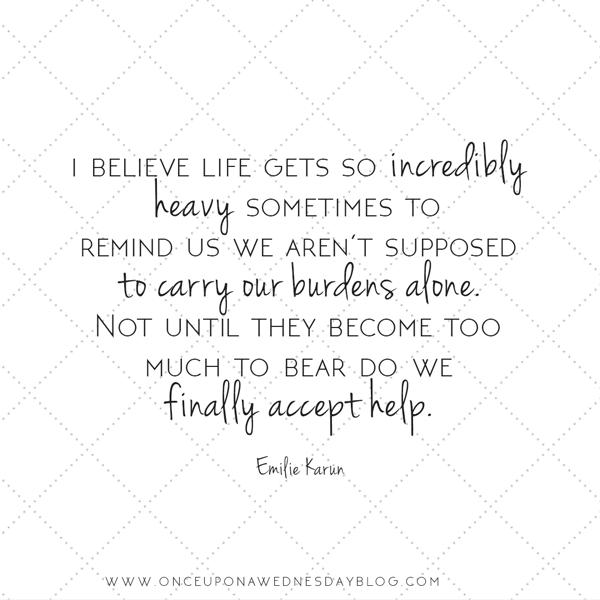
Life overwhelms us to force us out of our silos of self reliance and remind us we need one another.
What do you think Do you struggle to accept help? Do you find giving or receiving easier and how can you begin to let people in more?


